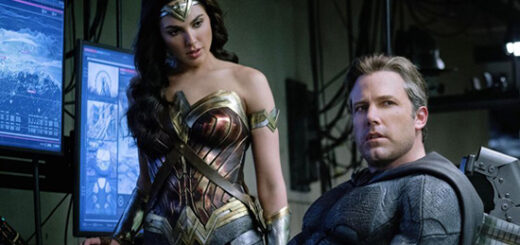Marc Alan Fishman: Just A League of Their Own
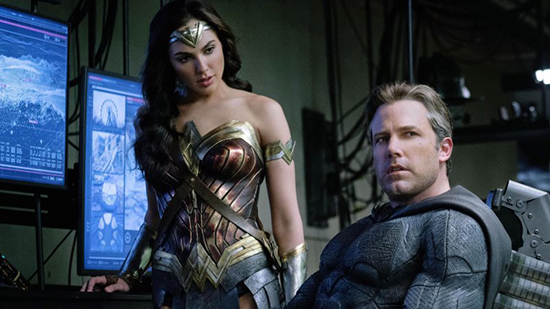
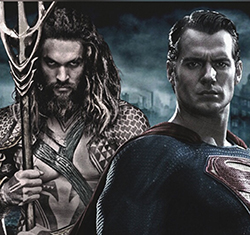 Somewhere around the mid-point of one of the chaotic action sequences in Justice League, a thought echoed in my head. “Avengers was better. I know it was. But why?” Put a pin in that.
Somewhere around the mid-point of one of the chaotic action sequences in Justice League, a thought echoed in my head. “Avengers was better. I know it was. But why?” Put a pin in that.
And while we’re at it, consider this the blanket SPOILER ALERT. I’m not going to be holding back on plot points and such.
Justice League was a solid effort to continue DC’s course correction. Full stop. The flick tries hard to shake itself of its sullen feeder-films – save for Wonder Woman, which wasn’t downtrodden at all – and ultimately sticks the landing by final credit roll. Over the course of two hours (and change), Zach Snyder, Joss Whedon, and Chris Terrio assemble their (kinda) Lanternless league efficiently. The threat is worthy of the big bangers of the DC(E)U. The quips and sardonic looks feel well-worn and dare I say earned.
So why did the entire movie leave me feeling an uneasy mélange of contentedness balanced equally with ennui? I mean, Rao-be-damned, the movie just made me use the word ennui!
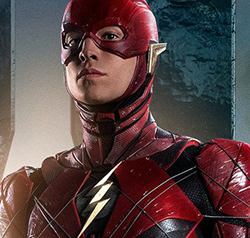 When I noted the efficient assemblage of the titular superteam, it comes couched with a cacophony of caveats. Our introduction to Barry Allen / The Flash seems to speed through his origin in a manner sans-irony given his power set. While he’d been on the fringes of Batman v Superman, we’ve been granted no real anchor to his character by the time he’s donning his car-wreck of a costume. It’s all flashes of awkward Big Bang Theory Sheldonisms smashed on top of tearful angst over the incarceration of Henry Allen. Late in the film, he shares a moment (one of the better exchanges, I should add) with Victor Stone / Cyborg, declaring they are the accidents. But because it comes so late – during the predictable recuperation of the nearly-defeated team scene (that all superhero team movies need, I guess) – it just feels like a tacked-on bon mot, instead of a necessary moment of respite.
When I noted the efficient assemblage of the titular superteam, it comes couched with a cacophony of caveats. Our introduction to Barry Allen / The Flash seems to speed through his origin in a manner sans-irony given his power set. While he’d been on the fringes of Batman v Superman, we’ve been granted no real anchor to his character by the time he’s donning his car-wreck of a costume. It’s all flashes of awkward Big Bang Theory Sheldonisms smashed on top of tearful angst over the incarceration of Henry Allen. Late in the film, he shares a moment (one of the better exchanges, I should add) with Victor Stone / Cyborg, declaring they are the accidents. But because it comes so late – during the predictable recuperation of the nearly-defeated team scene (that all superhero team movies need, I guess) – it just feels like a tacked-on bon mot, instead of a necessary moment of respite.
And what of the aforementioned Mr. Stone? He’s Deus Ex Machina – ironically, figuratively, and literally. He’s given what might best be described as the affirmative action gift of the longest origin of the group, but never are we invited in the mind of the part-man-part-machine. Stone is stone-faced essentially for the length of Justice League, removing every ounce of characterization Khary Payton has been investing into Cyborg since 2003. When Cyborg of Justice League mutters a soft-spoken Booyah, it comes with the tenacity of a wet fart – meant only as lip-service, not fan-service.
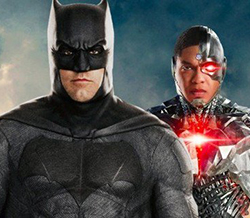 And then we have Aquaman by way of the Abercrombie shirtless collection. WWE’s Roman Reigns, err, Jason Momoa exists as multiverse variant of Arthur Curry so devoid of the traits I’d long associated with the character, I all but abandoned any known factoids of the comic book original minutes into his first scene opposite Bruce Wayne – who himself was enjoying his take on the Fall Hugo Boss collection. Their shared scene, the one you no doubt saw in the trailers and commercials, sets us up for the League’s water-based warrior. He’s a hard-drinking, hard-fighting, surfer-lone-wolf with a pitchfork and a chip on his shoulder. His origin isn’t really told so much as it is scribbled, child-like, on a bar wall, and then half-dialogue-vomited in an appropriately confusing underwater scene. Verily.
And then we have Aquaman by way of the Abercrombie shirtless collection. WWE’s Roman Reigns, err, Jason Momoa exists as multiverse variant of Arthur Curry so devoid of the traits I’d long associated with the character, I all but abandoned any known factoids of the comic book original minutes into his first scene opposite Bruce Wayne – who himself was enjoying his take on the Fall Hugo Boss collection. Their shared scene, the one you no doubt saw in the trailers and commercials, sets us up for the League’s water-based warrior. He’s a hard-drinking, hard-fighting, surfer-lone-wolf with a pitchfork and a chip on his shoulder. His origin isn’t really told so much as it is scribbled, child-like, on a bar wall, and then half-dialogue-vomited in an appropriately confusing underwater scene. Verily.
Reading through my last few paragraphs may make you believe I utterly loathed Justice League. But you’d be wrong. For every dour note I left the theater with, came an equal smirk of joy overseeing the goodness that Snyder actually captured. Superman, after two incredibly dark films finally is presented the way we want him to be. Full of hope, love, and swagger. Wonder Woman continues to be the best female protagonist in comic book films by several levels of magnitude. And Batman? He’s rich. He’s funny when he wants to be. Believably human. And hilariously voice-modulated. All that, and we didn’t get any meaningless self-sacrifices, or fighting a giant blue sky-beam. Heck, the stinger at the end of the film even got me to clap.
So, why then, did I inevitably wind up in an Avengers conundrum? It stands to note that there’s no way to ignore that Marvel assembled their uber-team successfully a full five-years ago. And by the time it made its way to the movieplex, had given the general teeming masses of newly minted fanboys (and girls) time to live with the main members of their cast (Iron Man, Captain America, and Thor primarily). Because the feeder films (Iron Man, Captain America: The First Avenger, and Thor) had all been well-received, there was a feeling of earned glee when the Avengers coalesced to punch mindless CGI aliens for forty minutes. In contrast, Justice League carries with it the weight of mismanaged and darkly derided prequels (minus Wonder Woman), and oozes desperation from its pores. It’s cut-to-shreds-by-committee, and feels as such. Avengers was lived in. Justice League came across like a wrongly-coined #MeToo.
But perhaps, there exists a silver lining amidst my kvetching. Justice League did leave me excited for what was to come. And it’s that feeling above any others that leaves my eyes on the horizon for the pantheon of DC superheroes… rather than the floor in collective shame.

